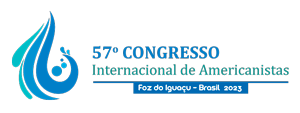| Dados do autor | |
|---|---|
| Nome | Piero Tellerías |
| E-mail do autor | Email escondido; Javascript é necessário. |
| Sua instituição | Université Paris 1 Panthéon Sorbonne |
| Sua titulação | Doutorando |
| País de origem do autor | Chile |
| Dados co-autor(es) [Máximo de 2 co-autores] | |
| Proposta de Paper | |
| Área Temática | 07. Derechos Humanos y Cultura de la Paz |
| Grupo Temático | ¿La(s) crisis, nuevo instrumento de gestión de lo social (y de lo político)? Gobernar mediante la crisis, experiencias latinoamericanas |
| Título | Life as a Never-Ending Security Crisis: Interpreting our World through the Emergency and Disaster Management Lenses |
| Resumo | In a world that has become populated by events whose “uncertainty” cannot be reduced to risk, governments and experts urge populations to be prepared and “resilient” in order to live with permanent insecurity. How is it that we came to think of our life as a never-ending security crisis? To what extend this draws on the interpretation of our everyday experiences through the “emergency and disaster management” lenses? On what accounts emergencies and disasters are thought as liable to be governed by requesting citizens to be responsible, prepared and resilient? On what basis do experts and politicians demand populations to adopt a permanent state of “awareness” and “preparedness”? Why is this permanent state of awareness and preparedness said to reduce vulnerability to multiple hazards and threats? What does it entail to understand our life as a never-ending security crisis? This paper examines these questions through the analysis of a specific emergency and disaster management device recently implemented in Chile: The Community Emergency Response Team (CERT) program. Concretely, this paper studies how the implementation of a community-level intervention contributes to this security-crisis normalization through specific emergency and disaster management practices and cognitive operations: (1) identity management techniques, (2) responsabilization practices, and (3) a cyclical framing of time. Although elaborated to reduce uncertainty and enhance our security, this paper examines how these practices foster the illusion of controlling the consequences of emergencies and disasters through the promotion of “best practices” and scenario-based exercises and simulations. |
| Palavras-chave | |
| Palavras-chave |
|
